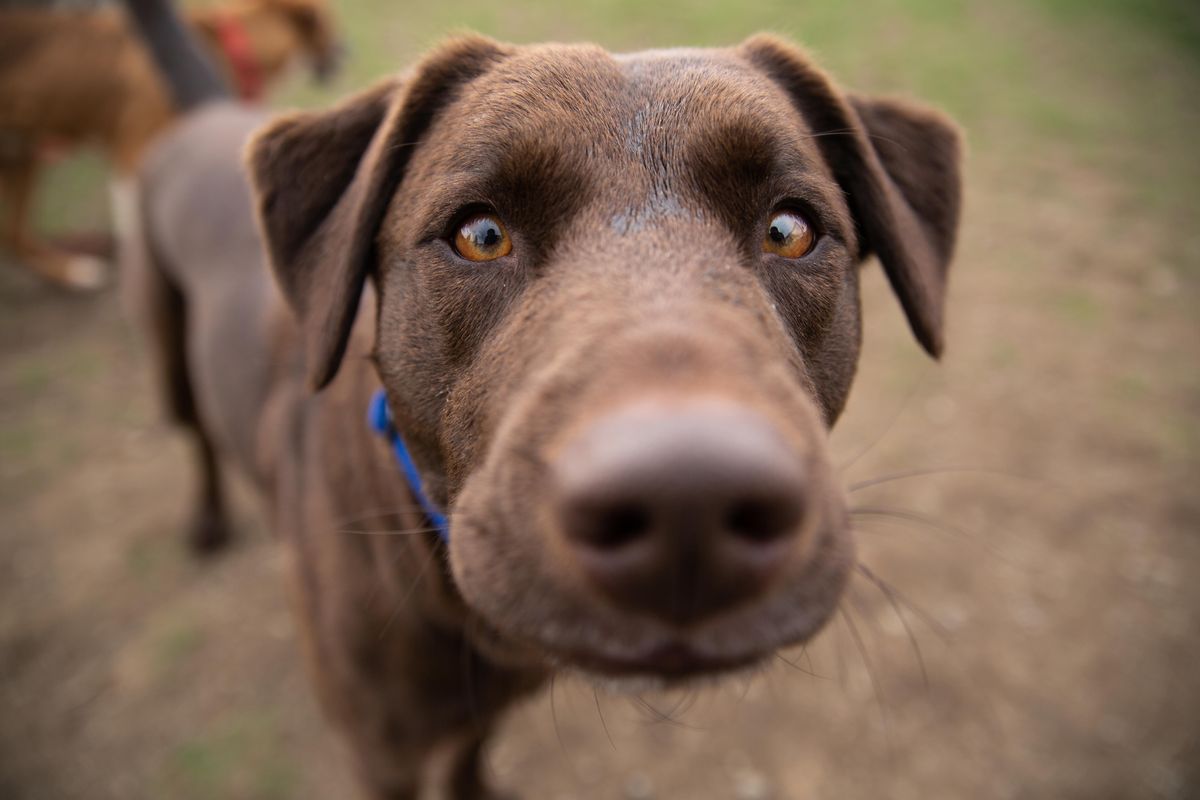Canine connections: Spokane Humane Society’s Dogs Playing for Life program lets shelter dogs socialize, blow off steam

The dogs gathered in packs and small groups, tails wagging, as they romped and played as part of dog play group training offered by Dogs Playing for Life at the Spokane Humane Society last week.
The five days of training was offered to staff and volunteers at the Spokane Humane Society and other local pet rescue groups. The dogs were willing participants in the training. One took a dip in the play yard’s kiddie pool, and others romped and wrestled until they tired themselves out. One, a large yellow akbash named Jackson, lay napping in the center of the play yard while activity swirled around him.
“Each dog has a play style, and he’s a neutral,” said volunteer Yvonne Higgins Leech. “He just brings everybody down.”

Leech applied for a grant from the Lazin Animal Foundation that paid for the training. Dogs are social animals, and using the play yard together for 20 minutes offers the same amount of exercise as a two-hour walk with a volunteer, Leech said.
“They want to play together,” she said. “It’s a great use of resources. The benefits are incredible.”
Staff and volunteers were being trained on how to select dogs for a play group that would get along together and what happens when dogs with different play styles get together.
“Let the dogs come in, and let the dogs communicate with each other,” said Leech. “The dog will tell us whether they should stay or not.”
Dogs Playing for Life trainer Tucker Eurman kept up a running commentary as the dogs milled about, explaining their behavior. He experimented by taking dogs out and adding new ones in to see how different personalities handled the experience. He let the dogs do what they wanted and didn’t try to direct their play or introductions.
“Dogs speak dog,” Eurman said. “They don’t need us to micromanage them.”
Executive director Sheila Geraghty said she was originally hoping to get a grant for a dog trainer but thought the Dogs Playing for Life training for her staff and volunteers would be a huge improvement for her shelter dogs.
“It’s like getting 20 behavioralists,” she said.
When dogs are locked up in the shelter constantly, behavior problems can develop that can make it difficult to get a dog adopted. It’s also difficult to evaluate a dog’s personality when it’s locked up in a noisy, stressful environment, Geraghty said.
“Evaluating behavior behind the kennel isn’t fair,” she said. “You need to evaluate behavior in the play yard.”
By the first afternoon, things were fairly calm, Geraghty said, but the first morning session had a few disagreements between dogs before everyone settled down.
“They’re not used to doing this,” she said. “It’s so nice for them to be on the grass.”
One dog named Nelson was a “jerk” in the first morning session and had to be removed, but he was back in the afternoon with no problems, Geraghty said. “He’s learned that this is fun,” she said.
The play groups will provide enrichment for the dogs and allow volunteers to get to know their personalities. Volunteers can then provide that information to potential adopters. Playing outside is also great exercise for the dogs and can help reduce stress.
“These guys are going to sleep like babies,” she said.
During play groups staff members are in the play yard in case they need to break up any disagreements, but they mostly had little to do during the training sessions. The dogs were free to do as they pleased and had little interaction with the staff members.
“There’s no treats,” Geraghty said. “Their reward is getting out of that nasty kennel.”
The plan was to have each dog in the shelter participate in a play group during the five days of training. “They’re going to have a certificate on their kennel that they’ve completed five days of Dogs Playing for Life training,” she said.
Geraghty is looking forward to adding dog play groups to her organization. “We’re going to be running play groups every day,” she said.
She hopes to eventually add play groups that are open to the public to increase the socialization opportunities for her dogs.